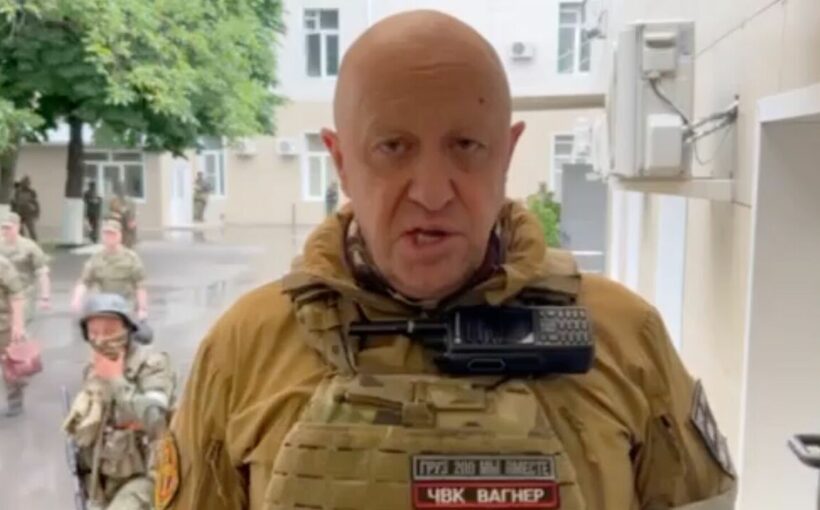Ukraine: Prigozhin says ‘not enough is being done’ by Russia
A pristine private jet, an Embraer Legacy 600, landed at a military airfield some 20km from Minsk, Belarus’ capital, on Tuesday morning.
The star passenger has been arguably the most talked about person in the world since the weekend: Yevgeny Prigozhin, the head of the Wagner Group mercenary outfit.
Just days before, Prigozhin had attempted to start a mutiny against Vladimir Putin with his troops, first capturing Rostov-on-Don before moving towards the Russian capital, Moscow.
They stopped short of the city which houses the Kremlin, and within hours the whole thing was over. Prigozhin had, reports showed, signed a deal with Putin that would see him exiled to Belarus in exchange for all criminal charges against him dropped.
A stunning end to an intense episode, many, like Emily Ferris of the Royal United Services Institute (RUSI), believe that Prigozhin has anything but got off scot-free, and will likely be watched day-by-day, minute-by-minute, in his new homeland, a place that has essentially become an extension of Russia.
READ MORE Lukashenko has gone from Putin’s lackey to kingpin holding the keys to power
Many have asked the question: Why Belarus? Ms Ferris thinks it’s logical for one of Putin’s biggest threats to head next door, with Belarus essentially acting as a prison for Prigozhin, watched over by Putin.
She told Express.co.uk: “Belarus certainly makes sense for Prigohzin to be semi-exiled.
“In terms of security and politics, it’s a friendly nation towards Russia, it’s highly penetrated by the Russian security services and its armed forces. It’s not a place that Prigohzin will ever really feel safe.
“It’s not a place that he I think would be able to sort of happily retire.
“So, it’s sort of going to keep him on his toes quite a bit. But we don’t really know what his future might be now. It’s very difficult to tell.”
We use your sign-up to provide content in ways you’ve consented to and to improve our understanding of you. This may include adverts from us and 3rd parties based on our understanding. You can unsubscribe at any time. More info
For Lukashenko, the moment couldn’t have come at a better time.
The Belarusian leader has been in power for 29 years, and in the past few years has rolled out some of the harshest repressions of his time in office.
It largely stems from the 2020 elections — but goes back decades — in which Lukashenko is believed to have rigged the vote in his favour after seeing widespread support for the opposition and western-facing candidate Svetlana Tikhanovskaya.
Desperate to hold on to power, Lukashenko called Putin for help to quell nationwide protests. An unprecedented response followed, and Belarusian authorities unleashed what Human Rights Watch described as a “brutal crackdown”, with thousands of people detained and subjected to torture. After the protests were quashed, opposition politicians and activists were similarly imprisoned.
Express.co.uk was previously told by exiled politician Valery Kavaleuski that no one was left untouched. “We have cases when both parents are thrown in prisons, leaving their children as orphans,” he said.
Don’t miss…
Sergei Shoigu: Putin’s right-hand man who has a family of secret love children[INSIGHT]
Charges dropped against Wagner chief Prigozhin after armed coup in Russia[LATEST]
Lukashenko ‘told to be ready to fight’ as Wagner chief launched coup in Russia[REPORT]
While Belarus and Russia have had a Union Treaty since the Nineties, the two have only grown closer since the election.
Belarus relies on Russia for much of its cash, exporting around 60 percent of its goods to the country. It similarly imports much of its goods from Russia because of Western-led sanctions.
As a result, Russia has increasingly used Belarus as an extension of its own country. Putin is known to have used southern Belarus, which borders Ukraine, as a launchpad for at least parts of his invasion.
Russian weapons, vehicles, soldiers and goods have been ferried to and from Belarus, and joint military training sessions between the Russian and Belarusian militaries have taken place.
What all of this means for Prigozhin, the likes of Ms Ferris say, is that he is essentially still in Russia and still under the watchful eye of Putin.
Yet, she suggests that not even the man pulling the strings knows what to do with the troublemaker.
“We don’t really know what future the Kremlin has booked for Prigozhin,” she said. “I think that’s partly because they don’t know themselves. I think they are still trying to work out the finer details.”
Source: Read Full Article




